- Home
- J. A. Konrath
Whiskey Sour
Whiskey Sour Read online
Whiskey Sour
Joe Konrath
This book is for M.
I love you today, and every day.
WHISKEY SOUR
1½ oz. whiskey1½ oz. sour mix
Shake well with ice and pour into an old-fashioned glass.
Garnish with cherry and orange slice.
Chapter 1
THERE WERE FOUR BLACK AND WHITES already at the 7-Eleven when I arrived. Several people had gathered in the parking lot behind the yellow police tape, huddling close for protection against the freezing Chicago rain.
They weren’t there for Slurpees.
I parked my 1986 Nova on the street and hung my star around my neck on a cord. The radio was full of chatter about “the lasagna on Monroe and Dearborn,” so I knew this was going to be an ugly one. I got out of the car.
It was cold, too cold for October. I wore a three-quarter-length London Fog trench coat over my blue Armani blazer and a gray skirt. The coat was the only one I had that fit over the blazer’s oversized shoulders, which left my legs exposed to the elements.
Freezing was the curse of the fashion savvy.
Detective First Class Herb Benedict hunched over a plastic tarpaulin, lifting up the side against the wind. His coat was unbuttoned, and his expansive stomach poured over the sides of his belt as he bent down. Herb’s hound dog jowls were pink with cold rain, and he scratched at his salt-and-pepper mustache as I approached.
“Kind of cold for a jacket like that, Jack.”
“But don’t I look good?”
“Sure. Shivering suits you.”
I walked to his side and squatted, peering down at the form under the tarp.
Female. Caucasian. Blonde. Twenties. Naked. Multiple stab wounds, running from her thighs to her shoulders, many of them yawning open like hungry, bloody mouths. The several around her abdomen were deep enough to see inside.
I felt my stomach becoming unhappy and turned my attention to her head. A red lesion ran around her neck, roughly the width of a pencil. Her lips were frozen in a snarl, the bloody rictus stretched wide like one of her stab wounds.
“This was stapled to her chest.” Benedict handed me a plastic evidence bag. In it was a three-by-five-inch piece of paper, crinkled edges on one end indicating it had been ripped from a spiral pad. It was spotty with blood and rain, but the writing on it was clear:
I let the tarp fall and righted myself. Benedict, the mind reader, handed me a cup of coffee that had been sitting on the curb.
“Who found the body?” I asked.
“Customer. Kid named Mike Donovan.”
I took a sip of coffee. It was so hot, it hurt. I took another.
“Who took the statement?”
“Robertson.”
Benedict pointed at the storefront window to the thin, uniformed figure of Robertson, talking with a teenager.
“Witnesses?”
“Not yet.”
“Who was behind the counter?”
“Owner. Being depoed as we speak. Didn’t see anything.”
I wiped some rain off my face and unbunched my shoulders as I entered the store, trying to look like the authority figure my title suggested.
The heat inside was both welcome and revolting. It warmed me considerably, but went hand in hand with the nauseating smell of hot dogs cooked way too long.
“Robertson.” I nodded at the uniform. “Sorry to hear about your dad.”
He shrugged. “He was seventy, and we always told him fast food would kill him.”
“Heart attack?”
“He was hit by a Pizza Express truck.”
I searched Robertson’s face for the faintest trace of a smirk, and didn’t find one. Then I turned my attention to Mike Donovan. He was no more than seventeen, brown hair long on top and shaved around the sides, wearing some baggy jeans that would have been big on Herb. Men got all the comfortable clothing trends.
“Mr. Donovan? I’m Lieutenant Daniels. Call me Jack.”
Donovan cocked his head to the side, the way dogs do when they don’t understand a command. Under his left armpit was a magazine with cars on the cover.
“Is your name really Jack Daniels? You’re a woman.”
“Thank you for noticing. I can show you my ID, if you want.”
He wanted, and I slipped the badge case off my neck and opened it up, letting him see my name in official police lettering. Lieutenant Jack Daniels, CPD. It was short for Jacqueline, but only my mother called me that.
He grinned. “Name like that, I bet you really score.”
I gave him a conspiratorial smirk, even though I hadn’t “scored” in ages.
“Run through it,” I said to Robertson.
“Mr. Donovan entered this establishment at approximately eight-fifty P.M., where he proceeded to buy the latest copy of Racing Power Magazine…”
Mr. Donovan held out the magazine in question. “It’s their annual leotard issue.” He opened it to a page where two surgically enhanced women in spandex straddled a Corvette.
I gave it a token look-over to keep the kid cooperative. I cared for hot rods about as much as I cared for spandex.
“Where he proceeded to buy the latest copy of Racing Power Magazine.” Robertson eyed Donovan, annoyed at the interruption. “He also bought a Mounds candy bar. At approximately eight fifty-five, Mr. Donovan left the establishment, and proceeded to throw out the candy wrapper in the garbage can in front of the store. In the can was the victim, facedown, half covered in garbage.”
I glanced out the storefront window and looked for the garbage can. The crowd was getting larger and the rain was falling faster, but the can was nowhere to be found.
“It went to the lab before you got here, Jack.”
I glanced at Benedict, who’d sneaked up behind me.
“We didn’t want things to get any wetter than they already were. But we’ve got the pictures and the vids.”
My focus swiveled back to the scene outside. The cop with the video camera was now taping the faces in the crowd. Sometimes a nut will return to the scene and watch the action. Or so I’ve read in countless Ed McBain books. I gave the kid my attention again.
“Mr. Donovan, how did you notice the body if it was buried in garbage?”
“I…er, Mounds was having a contest. I forgot to check my wrapper to see if I’d won. So I reached back into the garbage to find it…”
“Did the can have a lid?”
“Yeah. One of those push lids that says ”Thank you“ on it.”
“So you reached into the push slot…”
“Uh-huh, but I couldn’t find it. So I lifted the whole lid up, and there part of her was.”
“What part?”
“Her, uh, ass was sticking up.”
He gave me a nervous giggle.
“Then what did you do?”
“I couldn’t believe it. It was like, it wasn’t real. So I went back into the 7-Eleven and told the guy. He called the police.”
“Mr. Donovan, Officer Robertson is going to have to take you into the station to fill out a deposition. Do you need to call your parents?”
“My dad works nights.”
“Mom?”
He shook his head.
“Do you live in the neighborhood?”
“Yeah. A few blocks down on Monroe.”
“Officer Robertson will give you a ride home when you’re done.”
“Do you think I’ll be on the news?”
On cue, a network remote truck pulled into the lot, faster than the crappy weather warranted. The rear doors opened and the obligatory female reporter, perfectly made up and steely with resolve, led her crew toward the store. Benedict walked out to meet them, halting their advancement at the police barricade, giving them the closed
crime scene speech.
The medical examiner pulled up behind the truck in his familiar Plymouth minivan. Two uniforms waved him through the barricade and I nodded a good-bye to Robertson and went to meet the ME.
The cold was a shock, my calves instant gooseflesh. Maxwell Hughes knelt down next to the tarp as I approached. His expression was all business when I caught his eye, drizzle dotting his glasses and dripping down his gray goatee.
“Daniels.”
“Hughes. What do you have?”
“I’d put her death at roughly three to five hours ago. Suffocation. Her windpipe is broken.”
“The stab wounds?”
“Postmortem. No defense cuts on her hands or arms, and not enough blood lost to have been inflicted while she was alive. See how one edge is rough, the other smooth?” He used a latex-gloved hand to stretch one of the wounds open. “The blade had a serrated edge. Maybe a hunting knife.”
“Raped?”
“Not from what I can tell. No signs of semen. No visible trauma to the vagina or anus. But this isn’t an autopsy.” Max was fond of adding that final caveat, though I’d yet to see an instance when the autopsy didn’t corroborate every one of his observations.
“The mouth?”
“No apparent damage. Tongue intact, protruding slightly. Consistent with strangulation. No bite marks. The blood in the mouth seeped up through her throat after she died. That coincides with the pooling of blood in her face. She was stored upside down.”
“She was found face-first in a garbage can.”
Hughes made his mouth into a tight thin line, and then reached into his pocket for a clean handkerchief to wipe the rain from his glasses. By the time he tucked it away, the glasses were wet again.
“Looks like you’ve got a real psycho here.”
“We’ll need the report on this one right away, Max.”
He opened up the yellow plastic tackle box that housed the tools of his trade and began bagging the corpse’s hands. I left him to his work.
More cops and newsies and gawkers arrived, and the carnival atmosphere of an important murder got into full swing. It would offend me, if I hadn’t seen it so many times.
Benedict finished his impromptu statement for the media and began selecting uniforms for the door-to-door witness search. I went to pitch in. It boosted morale for the men to see their lieut pounding pavement with them, especially since it was probably futile in this instance.
The killer had dumped a body in a public place, where it was sure to be found. But he’d done it without attracting any attention.
I had a feeling this was only the beginning.
Chapter 2
MORNING. THE STALE SWEAT THAT CLUNG to me and the sour taste of old coffee grounds were constant reminders that I hadn’t slept yet.
As if I needed reminders. I have chronic insomnia. My last sound sleep was sometime during the Reagan administration, and it shows. At forty-six my auburn hair is streaked with gray that grows faster than I can dye it, the lines on my face shout age rather than character, and even two bottles of Visine a month couldn’t get all the red out.
But the lack of sleep has made me pretty damn productive.
Spread out before me on my cluttered desk, a dead woman’s life had been reduced to a collection of files and reports. I was combining all the information into a report of my own. It read like a test, with none of the blanks filled in.
Twelve hours had passed and we still didn’t know the victim’s name.
No prints or hairs or fibers on the body. No skin under the fingernails. Nothing solid in the door-to-door reports. But this lack of evidence was evidence in itself. The perp had been extremely careful.
The victim wasn’t sexually assaulted, and death had resulted from suffocation induced by a broken windpipe, as Max had guessed. The lesion around her neck was six millimeters thick. It didn’t leave fibers, which would indicate rope, and didn’t bite into the skin, which would imply a thin wire. The assistant ME suggested an electrical cord as a possible weapon.
Ligature marks around her wrists and ankles bore traces of twine. Staking out every store in Illinois that sold twine wasn’t too clever an idea, though it was mentioned.
The stab wounds were postmortem and made by a thick-bladed knife with a serrated back. There were twenty-seven wounds in all, of varying depth and size.
We were unable to pull any fingerprints from the garbage can Jane Doe was found in. Even Mike Donovan’s prints had been washed away by the rain. The contents of the can were an average assortment of convenience store garbage, except for one major item.
Mixed in with the wrappers and cups was a five-inch gingerbread man cookie. It was heavily varnished, like an old loaf of lacquered French bread that gourmet restaurants use for decoration. An elite task force of two people was assigned to Chicago’s hundred-plus bakeries to try and get a match. If they failed, there was an equal number of supermarkets that sold baked goods. Double that figure to include the neighboring suburbs. A huge job, all for nothing if it was homemade.
If this weren’t such a somber situation, the image of two detectives flashing around the picture of the gingerbread man and asking “Have you seen him?” would be pretty funny.
I took another sip of some coffee that the Gestapo could have used for difficult interrogations, and felt it bleed into my stomach, which didn’t approve. The caffeine surging through my veins left me nauseous and jittery. I gave my temples ten seconds of intense finger massage, and then went back to my report.
She was killed roughly three hours before Donovan discovered her body at 8:55. Depending on how much time the perp spent with her corpse, he could have killed her anywhere within a hundred-mile radius. That narrowed it down to about four million people. Take out women, children, the elderly, everyone with a solid alibi, and the 20 percent of the population who were left-handed, and I figured we had maybe seven hundred thousand suspects left.
So we were making progress.
Pressure from the mayor’s office forced us to involve the Feebies. They were sending up two agents from Quantico, special operatives in the Behavioral Science Unit. Captain Bains played up the technical end, extolling the virtues of their nationwide crime web, which would be able to match this murder up with similar ones from around the country. But in reality he disliked the Feds as much as I did.
Cops were fiercely territorial about their jurisdictions, and hated to have them trampled on. Especially by bureaucratic robots who were more concerned with procedure than results.
I went for another sip of coffee, but the cup was mercifully empty.
Maybe one of the leads would pan out. Maybe someone would identify the Jane Doe. Maybe the Feds and their super crime-busting computer would solve the case moments after they arrived.
But a feeling in my gut that wasn’t entirely coffee-related told me that before we made any real progress, the Gingerbread Man would kill again.
He’d done too much planning to make this a one-time-only event.
Herb walked into my office, carrying an aromatic cup of hot Dunkin“ Donuts coffee, a dark roast by the smell of it. But the way he poured it greedily down his throat made it apparent he hadn’t brought it for me.
“Got the serum tests.” He dropped a report on my desk. “Traces of sodium secobarbital found in her urine.”
“Seconal?”
“You’ve heard of it?”
I nodded. I’d researched every insomnia remedy going back to Moses. “I’ve read about it. Went out of vogue when Valium came around, which went out of vogue with Halcion and Ambien.”
I hadn’t ever tried Seconal, but had given the others a shot. The depression they caused was worse than the sleepless nights. My doctor had offered to prescribe Prozac to combat the depression, but I didn’t want to go down that slippery slope.
“Needle puncture on the upper arm was the entry point. ME said two ccs would put a hundred-and-fifty-pound person under in just a few seconds.”
“Is Seconal prescribed anymore?”
“Not much. But we caught a break. Only hospital pharmacies carry injectionals. Because it’s a Control two class drug, every order has to be sent to the Illinois Department of Professional Regulations. I got a list of all recent orders. Only a dozen or so.”
“Also check for thefts from hospitals and manufacturers.”
Benedict nodded, finishing his coffee. “You look like a bowl of crap, Jack.”

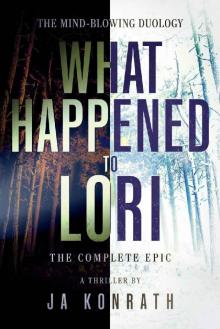 What Happened to Lori
What Happened to Lori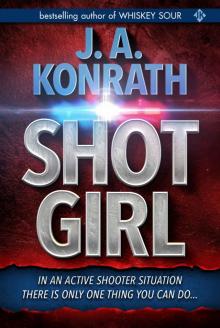 Shot Girl
Shot Girl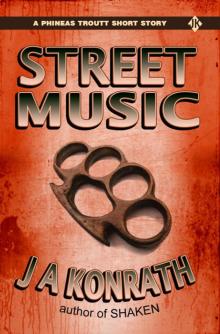 Street Music
Street Music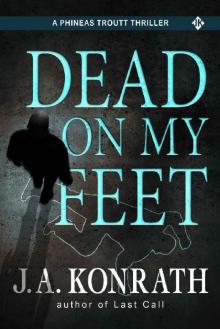 Dead on My Feet
Dead on My Feet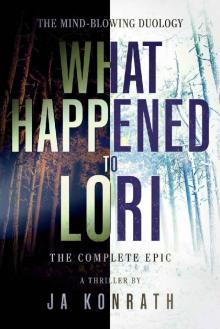 What Happened To Lori - The Complete Epic (The Konrath Dark Thriller Collective Book 9)
What Happened To Lori - The Complete Epic (The Konrath Dark Thriller Collective Book 9)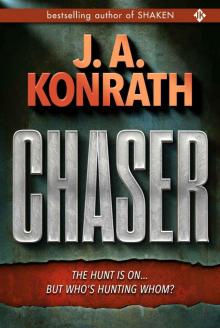 Chaser
Chaser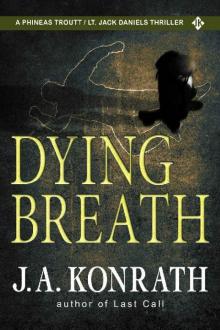 Dying Breath - A Thriller (Phineas Troutt Mysteries Book 2)
Dying Breath - A Thriller (Phineas Troutt Mysteries Book 2)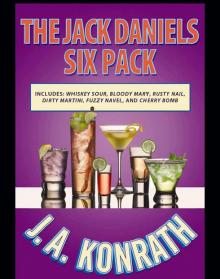 Jack Daniels Six Pack
Jack Daniels Six Pack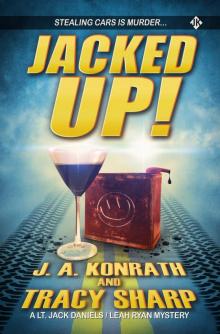 Jacked Up! (A Lt. Jack Daniels/Leah Ryan Mystery)
Jacked Up! (A Lt. Jack Daniels/Leah Ryan Mystery)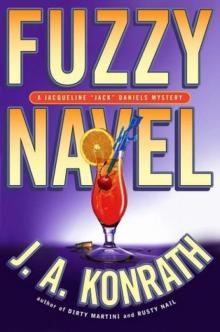 Fuzzy Navel
Fuzzy Navel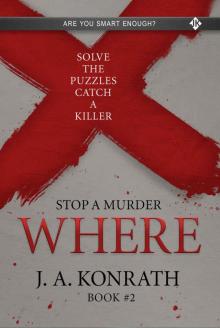 STOP A MURDER - WHERE (Mystery Puzzle Book 2)
STOP A MURDER - WHERE (Mystery Puzzle Book 2)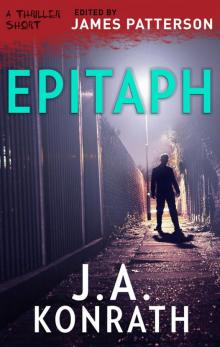 Epitaph
Epitaph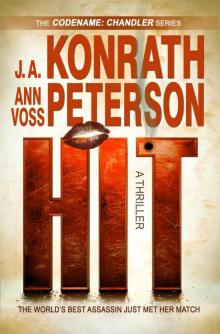 Hit: A Thriller (The Codename: Chandler)
Hit: A Thriller (The Codename: Chandler)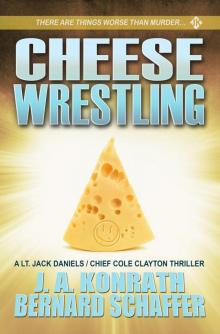 Cheese Wrestling: A Lt. Jack Daniels/Chief Cole Clayton Thriller
Cheese Wrestling: A Lt. Jack Daniels/Chief Cole Clayton Thriller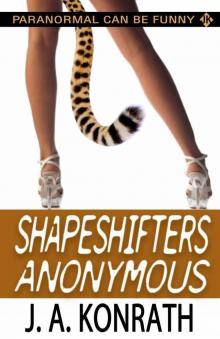 Shapeshifters Anonymous
Shapeshifters Anonymous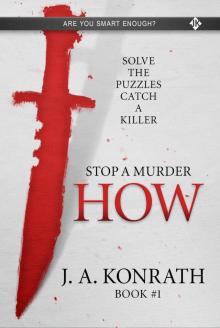 STOP A MURDER - HOW (Mystery Puzzle Book 1)
STOP A MURDER - HOW (Mystery Puzzle Book 1) Bloody Mary
Bloody Mary Dying Breath
Dying Breath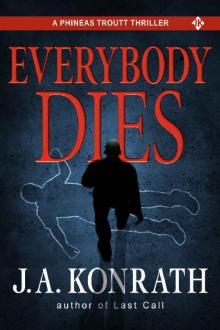 Everybody Dies - A Thriller (Phineas Troutt Mysteries Book 3)
Everybody Dies - A Thriller (Phineas Troutt Mysteries Book 3) DRACULAS (A Novel of Terror)
DRACULAS (A Novel of Terror) Shot of Tequila
Shot of Tequila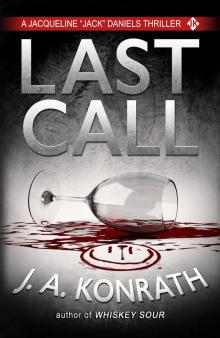 Last Call - A Thriller (Jacqueline Jack Daniels Mysteries Book 10)
Last Call - A Thriller (Jacqueline Jack Daniels Mysteries Book 10)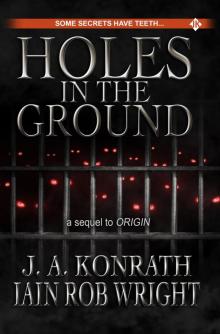 Holes in the Ground
Holes in the Ground![Shaken [JD 07] Read online](http://i1.bookreadfree.com/i1/04/01/shaken_jd_07_preview.jpg) Shaken [JD 07]
Shaken [JD 07]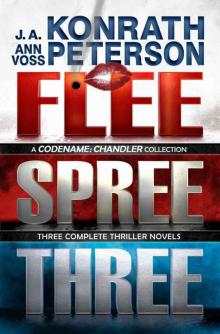 Flee, Spree, Three (Codename: Chandler Trilogy - Three Complete Novels)
Flee, Spree, Three (Codename: Chandler Trilogy - Three Complete Novels)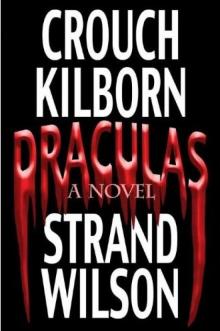 Draculas
Draculas Jack Daniels Stories
Jack Daniels Stories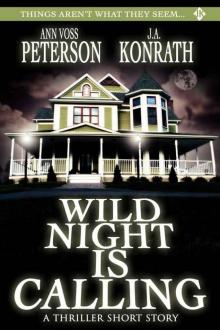 Wild Night is Calling
Wild Night is Calling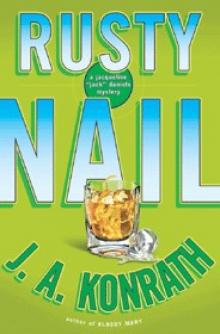 Rusty Nail
Rusty Nail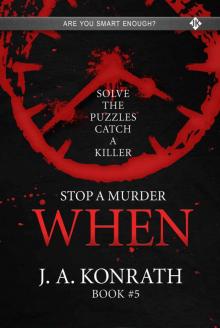 STOP A MURDER - WHEN (Mystery Puzzle Book 5)
STOP A MURDER - WHEN (Mystery Puzzle Book 5)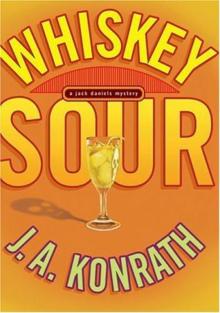 Whiskey Sour
Whiskey Sour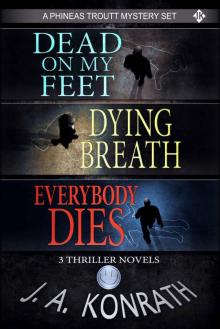 Phineas Troutt Series - Three Thriller Novels (Dead On My Feet #1, Dying Breath #2, Everybody Dies #3)
Phineas Troutt Series - Three Thriller Novels (Dead On My Feet #1, Dying Breath #2, Everybody Dies #3)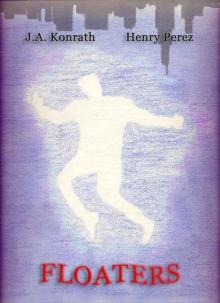 Floaters - A Jack Daniels/Alex Chapa Mystery
Floaters - A Jack Daniels/Alex Chapa Mystery J.A. Konrath / Jack Kilborn Trilogy - Three Scary Thriller Novels (Origin, The List, Haunted House)
J.A. Konrath / Jack Kilborn Trilogy - Three Scary Thriller Novels (Origin, The List, Haunted House)![Shaken (Jacqueline Jack Daniels Mysteries) [Plus Bonus Content] Read online](http://i1.bookreadfree.com/i2/04/10/shaken_jacqueline_jack_daniels_mysteries_plus_bonus_content_preview.jpg) Shaken (Jacqueline Jack Daniels Mysteries) [Plus Bonus Content]
Shaken (Jacqueline Jack Daniels Mysteries) [Plus Bonus Content]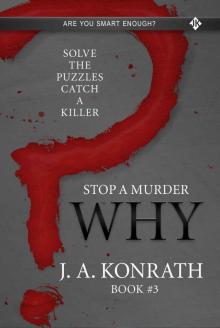 STOP A MURDER - WHY (Mystery Puzzle Book 3)
STOP A MURDER - WHY (Mystery Puzzle Book 3)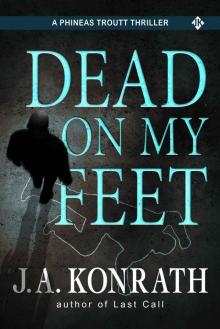 Dead On My Feet - A Thriller (Phineas Troutt Mysteries Book 1)
Dead On My Feet - A Thriller (Phineas Troutt Mysteries Book 1) Cherry Bomb
Cherry Bomb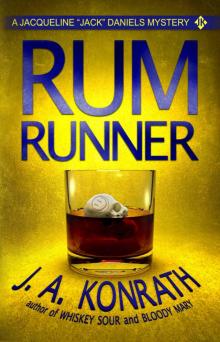 Rum Runner - A Thriller (Jacqueline Jack Daniels Mysteries Book 9)
Rum Runner - A Thriller (Jacqueline Jack Daniels Mysteries Book 9)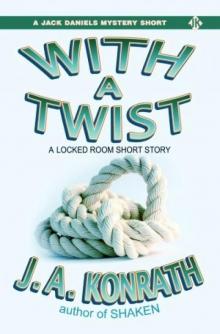 With a Twist
With a Twist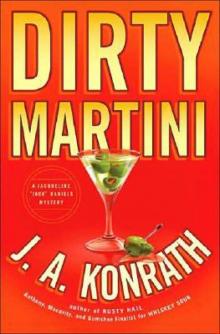 Dirty Martini
Dirty Martini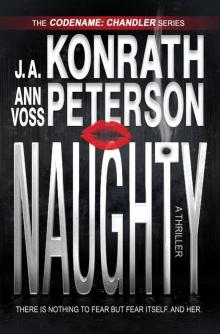 Naughty
Naughty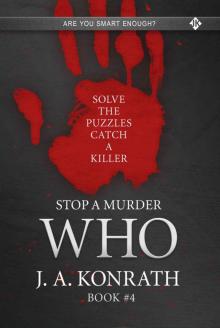 STOP A MURDER - WHO (Mystery Puzzle Book 4)
STOP A MURDER - WHO (Mystery Puzzle Book 4)